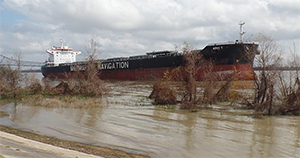Federal investigators believe a towboat captain’s cellphone use was a key factor in chain of collisions last year on the Lower Mississippi River.
The towboat Loretta G. Cenac was falling back behind another towboat as the Greek-flagged bulk carrier Aris T approached at 1954 on Jan. 31. The ship missed the tow, but it struck several vessels and structures along the left descending bank. The incident at mile marker 125 near Norco, La., caused nearly $60 million in damage and injured two dockworkers.
“Had the captain on the Loretta G. Cenac been focused on his navigational duties instead of on the communication with his girlfriend at 1947, the images on the vessel’s radar and electronic chart would likely have raised his awareness of the dangerous traffic situation that was developing,” the National Transportation Safety Board (NTSB) accident report said.
Investigators also found the Aris T pilot “had the opportunity as early as 1940 to identify the traffic situation developing upriver and assess the need for action on his part.”
The 753-foot bulker was heading upriver to a grain terminal with a New Orleans-Baton Rouge Steamship Pilots Association pilot on board. The weather was clear and cool, with a river current of 3 to 4 knots.
The ship cleared the Hale Boggs Memorial Bridge in Luling, La., at 1928. Nine miles ahead, at mile marker 130, the 2,000-hp Loretta G. Cenac and the 3,150-hp towboat Elizabeth M. Robinson were pushing downriver, each with three 300-foot loaded tank barges. Both tows were headed to nearby fleeting areas.
Loretta’s captain sought to overtake the other tow along a river section known as Thirty-Five Mile Point. Elizabeth’s captain declined the proposal but reconsidered a few minutes later and the two made passing arrangements, with Loretta to pass on Elizabeth’s port.
Elizabeth’s captain contacted the Aris T pilot over radio at 1946 and the two agreed to a port-to-port passage. A minute later, Loretta’s captain discussed the arrangement with the pilot but warned he was “way out in the middle” while trying to pass Elizabeth.
Three minutes later, at 1949, the Loretta captain aborted the passing maneuver and began falling back behind Elizabeth. Loretta’s captain and the pilot discussed changing the passing arrangement but ultimately kept the port-to-port arrangement.
“We’ve got plenty of room, come on with it,” the pilot told Loretta’s captain at 1950. A minute later the pilot asked whether Loretta’s engines were pushing astern.
“No, (Elizabeth’s) right by me, sliding … down on me. I am just trying to hold him. I’ve got about 20 foot off of him,” Loretta’s captain responded.
“All right, just keep driving on her. You gonna fall on me if you don’t,” the pilot said, according to the report.
Over the next couple minutes, the pilot ordered a series of rudder commands to create more space between the ship and Loretta, but it wasn’t enough. Aris T was already near the left descending bank where several vessels were moored at the Valero dock at mile marker 125.2, and the bulker had little room to operate.
Aris T’s aft starboard quarter hit an empty tank barge moored alongside another barge connected to the towboat SCF Vision at 1953. The pilot ordered the anchor dropped and engines astern to slow down, but the ship continued upriver and struck another berth on the left bank at 1957. A minute later, the ship hit the underway towboat Pedernales, pushing it into a barge which was then pressed against the shore facility, according to investigators.
“Appreciate it there, Loretta,” the pilot said after the initial impact.
“I tried everything, I had a cable come undone,” the towboat captain responded.
“Huh,” the pilot shot back, “you just caused an accident.”
The NTSB has long been concerned about non-operational cellphone use, particularly by crew in “safety-related positions.” The agency considers talking on phones “visually, manually and cognitively distracting” and warns that texting is even more disruptive. In a 2010 advisory, the agency “specifically mentioned the risk of using these devices when navigating alone, such as the captain on the Loretta G. Cenac did on the day of the accident,” the report said.
The NTSB had previously requested the Coast Guard “regulate and enforce” non-operational cellphone use by key crewmembers, but the service has not acted on the request. In this case, the Loretta captain’s phone call began about the time he was making arrangements to meet Aris T. Investigators believe the phone call was probably a distraction.
The NTSB identified several issues other than the cellphone use in the minutes leading up to the impacts. Post-accident review of all three vessels showed each was “maneuvered in a manner that contradicted the good order and predictability established in the collision prevention rules.”
For instance, the NTSB said Loretta’s captain should have waited to begin the overtaking maneuver until it could be accomplished safely. He also should have aborted it sooner. Investigators suggested Elizabeth should have moved to starboard to create space for the overtaking tow.
The NTSB said Aris T likely could have reduced its speed leading up to the meeting with the towboats, particularly due to the overtaking maneuver toward the middle of the river.
Several lawsuits were filed as a result of the incident. Capt. Steve Hathorn, head of the New Orleans-Baton Rouge Steamship Pilots Association, declined to comment on the NTSB findings due to pending litigation.
Cenac Marine of Houma, La., which has policies against cellphone use that were not followed, operated Loretta G. Cenac. Genesis Marine of Houston operated Elizabeth M. Robinson. Neither company responded to messages seeking comment. Aris T is operated by Marmaras Navigation Ltd.

